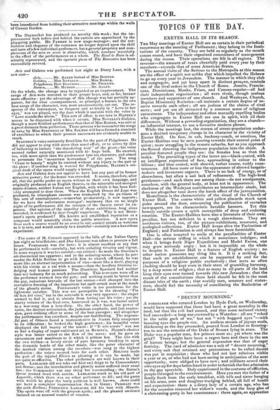Aces and Galatea was performed last night at Drury Lane,
with a new cast— Ads, Mr. ALLEN instead of Miss HORTON.
Galatea, --Miss NovELLo Miss ROMER.
Polyphemus, Herr STAUDIOL Mr. PHILLIPS.
Damon, Mr. HUDSON Mr. ALLEN.
On the whole, the change may be regarded as an improvement. The songs of Aces were restored to their proper keys, and, so far, became more effective : yet the advantage of this change was but partially ap- parent, for the oboe secompaniment, so principal a feature in the two best songs of the character, was, most unaccountably, cut out. The re- sponse of the instrument, so frequent and so lovely in " Love in her eyes," was not played, nor the duet which it sustains with the voice in "Love sounds the alarm." This sort of effect is too rare in HANDEL'S scores to be dispensed with when it occurs. Miss NOVELLO'S Galatea, though a more finished performance than that of Miss ROMER, was still at a great distance from perfection. Those persons who remember the songs as sung by Miss STEPHENS or Mrs. SALMON will have formed a standard of excellence to which their present successors are evidently unable to reach.
Sassuntoes voice eminently fitted him for the part of Polyphemus. He did not appear to sing with more than usual effort, or to strive by dint of bellowing to imitate "the thundering roar" of the giant—his voice seemed rather naturally associated with hi' huge bulk. He entered, too, with more spirit than his predecessor into his character, and aimed to personate the " monstrum horrendum " of the poet. The song "Cease to beauty" might be omitted without any injury to the part or the piece : if another song is wanted for Polyphemus, HANDEL'S ori- ginal draft of the opera would supply a better.
Acis and Galatea does not appear to have lost any part of its former attractive power ; for the house was crowded. It seems, therefore, after all, that the public prefer an opera written to their own language, and originally produced at an English theatre, to the miserable and mongrel music-dramas, neither Italian nor English, with which it has been fool- ishly attempted to dose them. When the English Donna del Logo was produced, its triumphant success was trumpeted by the pa:tisans of this sort of entertainment,—somewhat prematurely, it now appears ; for we have the unfortunate manager's testimony that on no single night of its performance did the receipts of the theatre cover its ex- penses. Our opinion of the inipalicy of these exhibitions, long since recorded, is confirmed by dear-bought experience. Why is not BENE- DICT'S opera produced ? His known and established reputation as a composer would assuredly claim the public attention. A new opera from such a source would be an event in our ,uusical annals as welcome as it is rare, and would scarcely be a doubtful—certainly not a hazardous experiment.


























 Previous page
Previous page